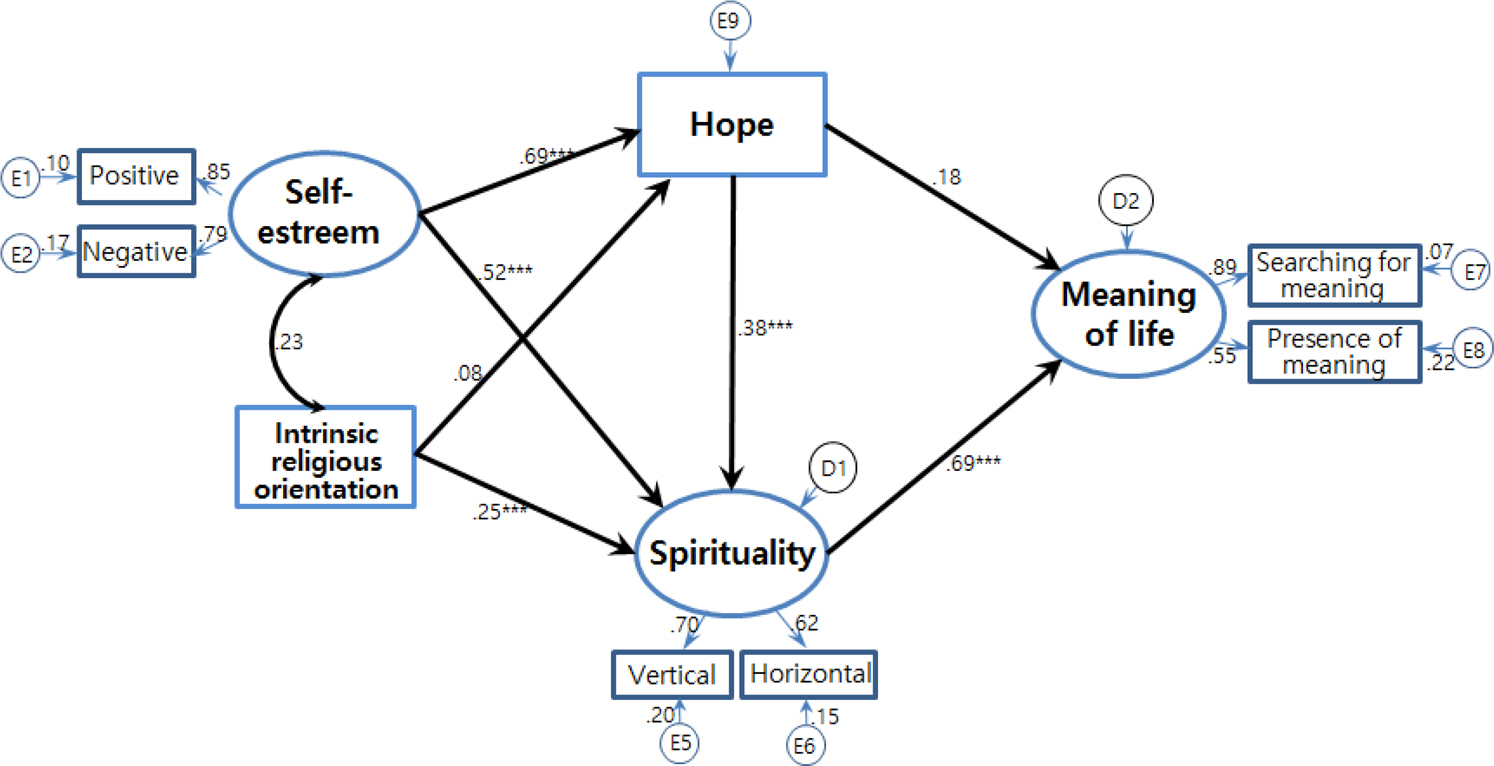Korean J Adult Nurs.
2017 Aug;29(4):363-372. 10.7475/kjan.2017.29.4.363.
A Structural Modeling of Middle-aged Adults' Meaning in Life
- Affiliations
-
- 1Department of Nursing, Changshin University, Changwon, Korea.
- 2College of Nursing, Catholic University of Pusan, Busan, Korea. sochoi@cup.ac.kr
- KMID: 2406363
- DOI: http://doi.org/10.7475/kjan.2017.29.4.363
Abstract
- PURPOSE
The purpose of the study was to describe the structural relationship of meaning in life, spirituality, hope, intrinsic religious orientation, and self-esteem among middle-aged adults.
METHODS
The sample included 344 participants between the ages of 40 and 60, who resided in one of four cities. The collected data were analyzed using SPSS 21.0, descriptive statistics and AMOS 20.0 which uses structural modeling to test whether the hypothesized model fits the collected data.
RESULTS
Middle-aged adult's spirituality was found to have a significant direct effect on meaning in life. Further, middle-aged adult's reported hope, intrinsic religious orientation, and self-esteem had a direct effect on spirituality. Lastly, self-esteem had a direct effect on hope.
CONCLUSION
The findings from the study indicated that spirituality was the best predictor of meaning in life among middle age. In addition, hope, intrinsic religious orientation, and self-esteem did not have a direct effect on the meaning in life, but had a indirect effect through spirituality.
Figure
Reference
-
1. Grün A. My age forty. Lee SW, translator. Seoul: With the Bible;1980.2. Kim MJ, Kim KB. Influencing of psychological well-being for the middle aged adults and elderly. Journal of East-West Nursing Research. 2013; 19(2):150–8. https://doi.org/10.14370/jewnr.2013.19.2.150.
Article3. Kim SR. Study on the spiritual exercises for midlife crisis [masters thesis]. Daegu: Keimyung University;2005.4. Frankl VE. Man's search for meaning. Lee SH, translator. Paju: Chunga;1984.5. Kim GS. Subjectivity of hope among Korean middle-aged adults. Journal of Digital Convergence. 2013; 11(10):629–38.6. Kweon YR, Jeon HO. Relationship of fatigue, family function and self-esteem of middle-aged women in menopausal periods. Journal of the Korea Academia-Industrial cooperation Society. 2012; 13(6):2579–88. https://doi.org/10.5762/KAIS.2012.13.6.2579.
Article7. Erikson EH. Child and society. 2nd ed.New York: W. W. Nor-ton & Company;1963.8. Snyder CR. Hope theory: rainbow in the mind. Psychological Inquiry. 2002; 13(4):249–75. https://doi.org/10.1207/S15327965PLI1304_01.9. Allport GW, Ross JM. Personal religious orientation and preju-dice. Journal of Personality and Social Psychology. 1967; 5(4):432–43. https://doi.org/10.1037/h0021212.
Article10. Kang HW. Hope, gratitude, self-esteem and religious orientation [masters thesis]. Seoul: The Catholic University of Korea;2007.11. Bernard CA. Spiritual theology. Jeong JC, Park I, translator. Seoul: Catholicbook;2007.12. Choi MS. The relationship of self-esteem, mental health, perceived social support & social avoidance and distress according to purpose in life. The Korean Journal of Health Psychology. 2011; 16(2):363–77.13. Kim GH, Kim KH. Effects of a self-esteem promotion program on self-esteem and meaning of life among female freshmen. Journal of Korean Academy of Psychiatric and Mental Health Nursing. 2009; 18(4):431–8.14. Hong KR, Lee JY. The mediating effect of meaning in life in the relation between teachers intrinsic religious orientation and mental health. Secondary Education Studies. 2014; 62(2):325–49.15. Song JY, Lee HK. The mediating effect of life meaning of childhood cancer patients' mothers in the link between their hope and posttraumatic growth. Korea Journal of Counseling. 2010; 11(4):1501–17.16. Chong YS, Jo SA. Source of meaning in life and efforts for meaning on happiness in Korean college students and mid-dle-aged. Korean Journal of Psychology: General. 2013; 32(3):507–31.17. Yoh JS, Kim BS, Choi HC. The structural relationship among spirituality, life meaning, symbolic immortality, and genera-tivity in middle aged adult. Korean Journal of Christian Counseling. 2013; 24(4):101–20.18. Woo JP. Professor Woo Jong Pil's concept of structure equation model and understanding amos 4.0~20.0 common. Seoul: Hanahara Publishing Co.;2014.19. Steger MF, Frazier P, Oishi S, Kaler M. The meaning in life questionnaire: assessing the presence of and search for meaning in life. Journal of Counseling Psychology. 2006; 53(1):80–93. https://doi.org/10.1037/0022-0167.53.1.80.
Article20. Oh PJ, Jeon HS, Soh WS. Spiritual assessment scale: psychometric evaluation of the Korean version. Asian Oncology Nursing. 2001; 1(2):168–79.21. Nowotny ML. Assessment of hope in patients with cancer: development of an instrument. In Oncology Nursing Forum. 1989; 16(1):57–61.22. Rosenberg M. Society and the adolescent self-image. Princeton: Princeton University Press;1965.23. Moon SB. Basic concepts and applications of structural equation modeling. Seoul: Hakjisa;2009.24. Foley L. Exploring the experience of spirituality in older women finding meaning in life. Journal of Religious Gerontology. 2001; 12(1):5–15. https://doi.org/10.1300/J078v12n01_03.
Article25. Del Santo Padre Francesco. Evangelii gaudium. Seoul: Catholic Bishops' Conference of Korea;2013.26. Choi MS, Son CN. The mediate effect of religious coping on intrinsic religious orientation and purpose of life. The Korean Journal of Health Psychology. 2010; 15(1):91–105.27. Je SB, Lee SB. The relationship between religious orientation and dysfunctional behavior and religious problem solving style: Development of Religious Orientation Scale. Studies in Religion. The Journal of the Korean Association for the His-tory of Religions. 1995; 11:245–80.28. Lee HJ, Sohn SK. Predictive factors of hope in patients with cancer. Korean Journal of Adult Nursing. 2000; 12(2):184–95.29. Yoon MO. The effect of spiritual nursing intervention on the meaning of life and spiritual distress of the terminal cancer patients. Korean Journal of Hospice Care. 2004; 5(2):64–74.
- Full Text Links
- Actions
-
Cited
- CITED
-
- Close
- Share
- Similar articles
-
- Meaning of Well-being for the Middle Aged Adults
- Factors Influencing Meaning in Life among the Middle-aged
- A Study on the Subjectivity of the Meaning of Life for Middle-Aged Women
- Meaning in Life of a Resident Community of Normal Adults
- Expectations of Middle aged Women for a life of Happiness to the Spouse



